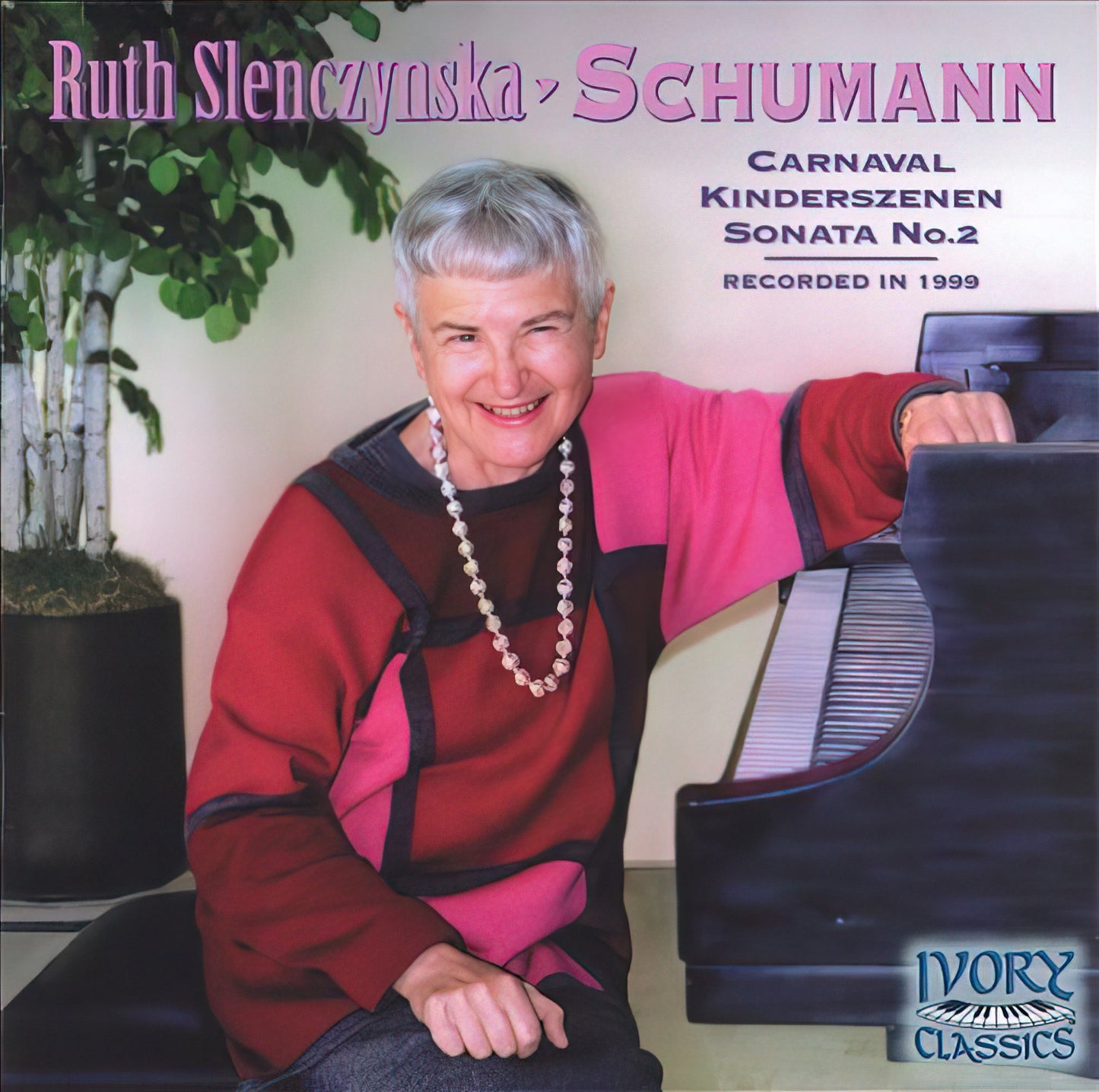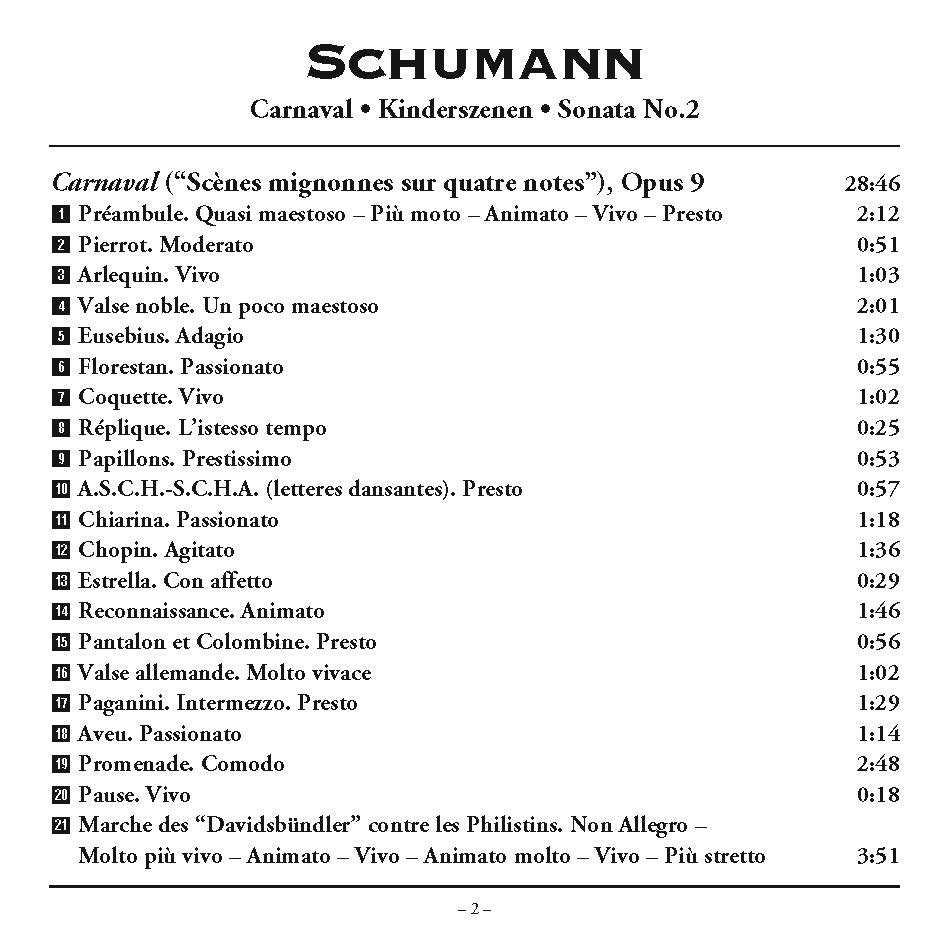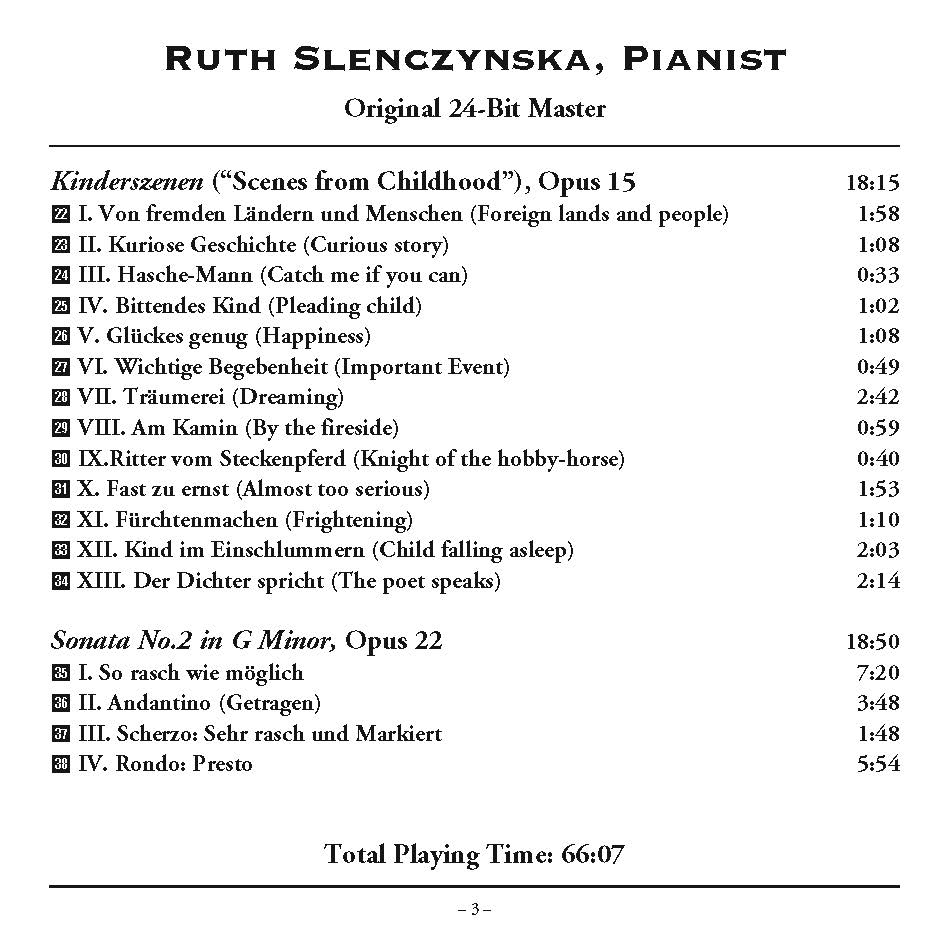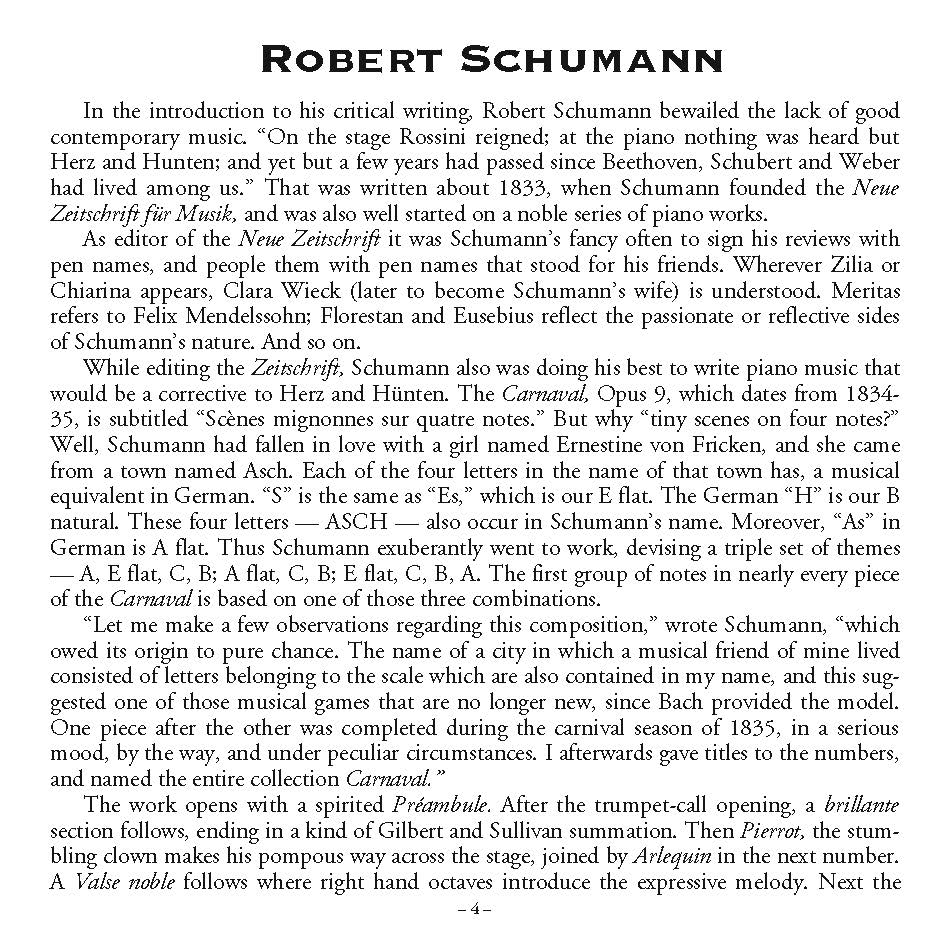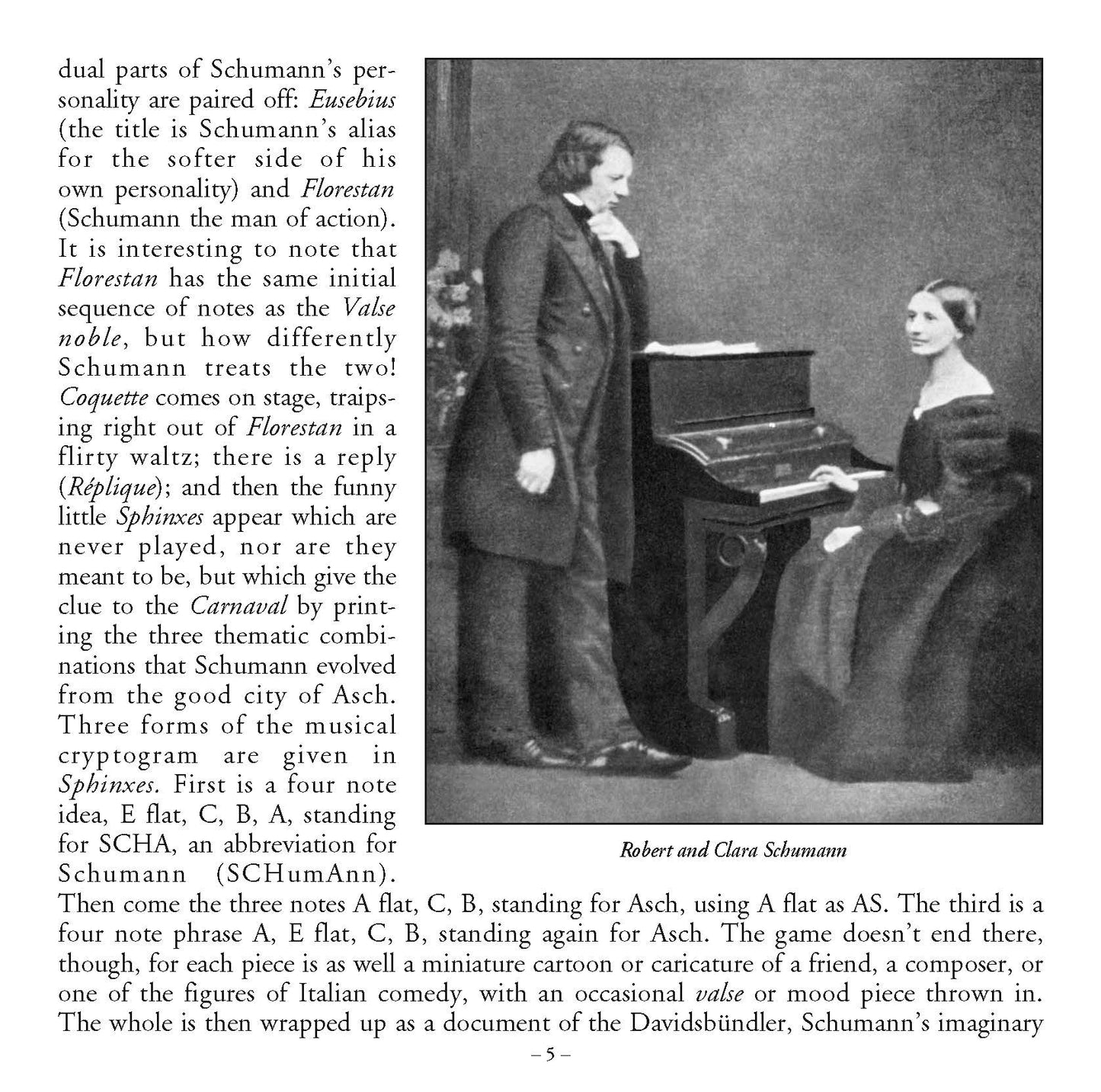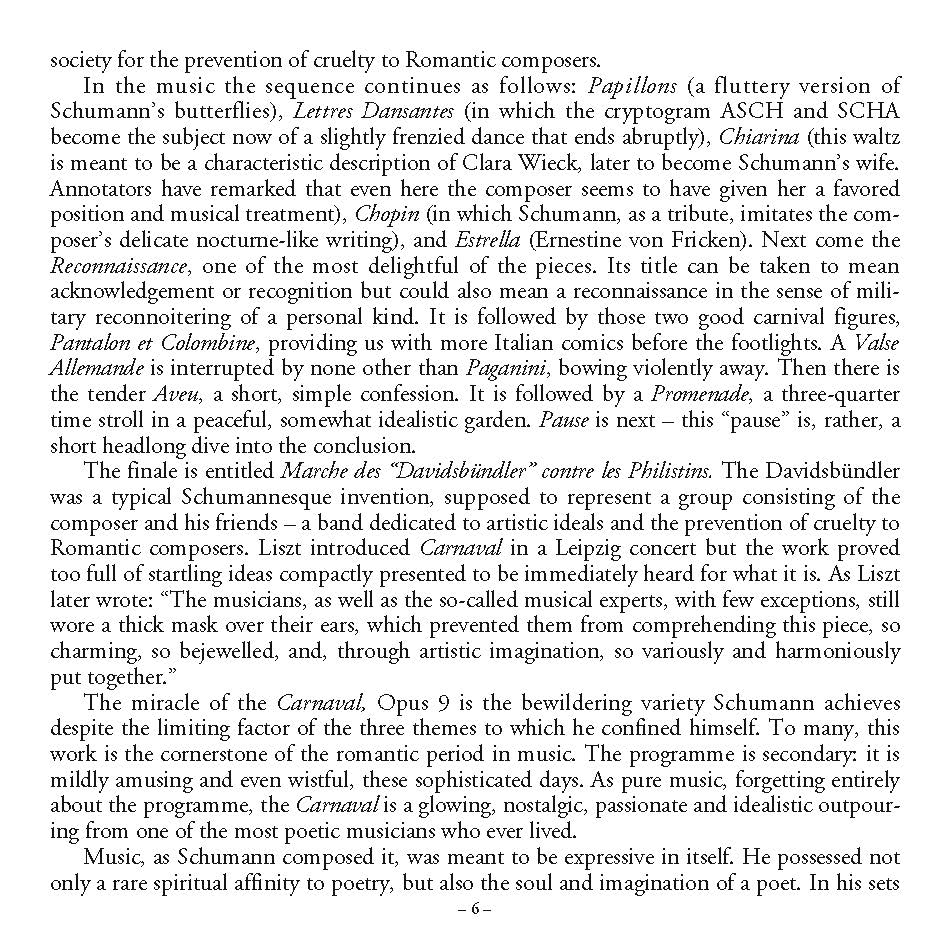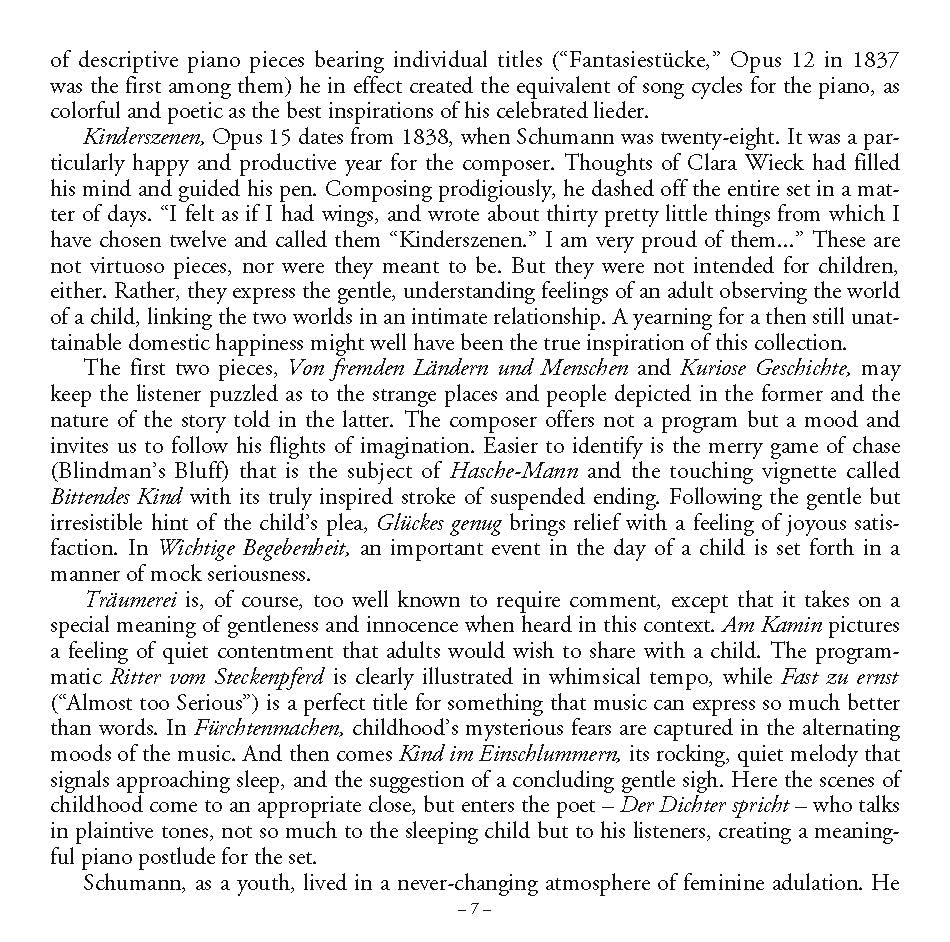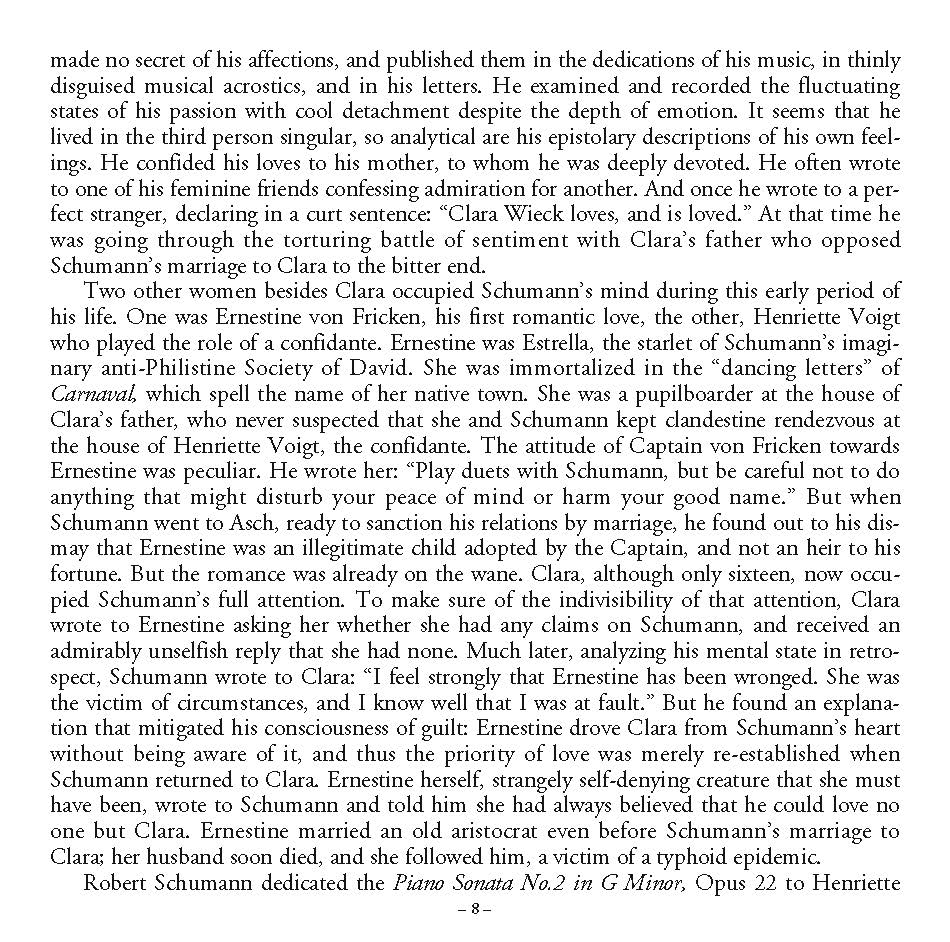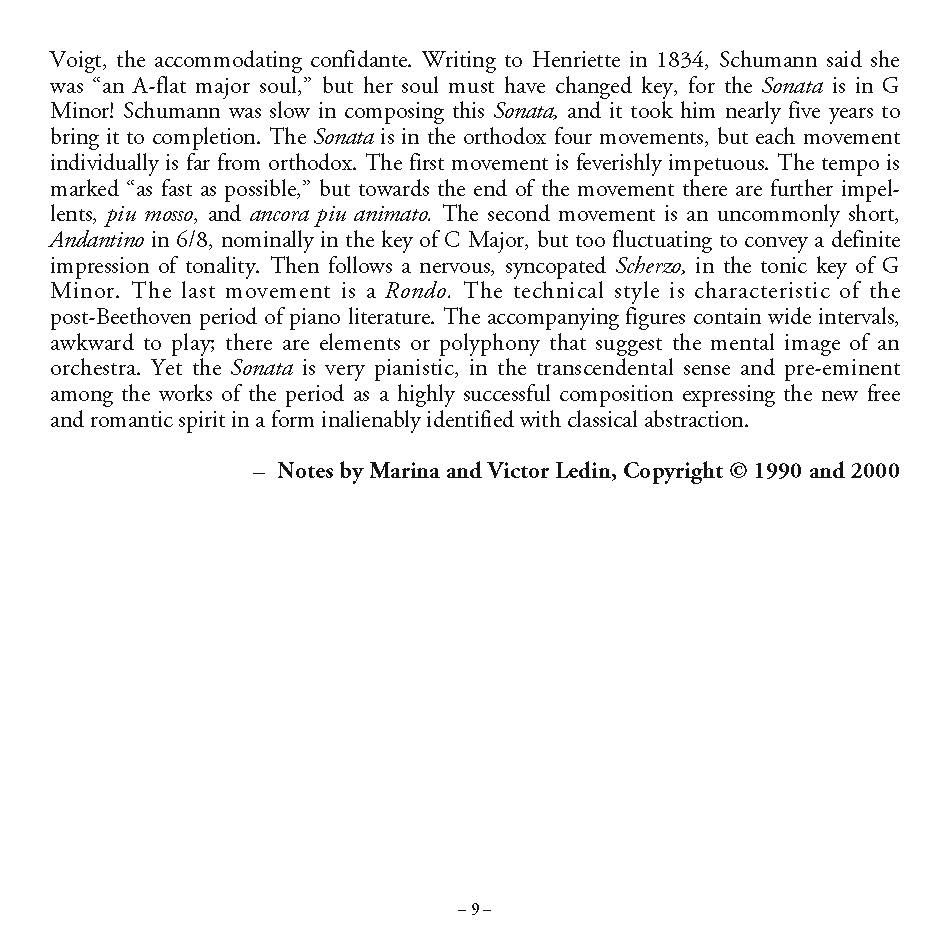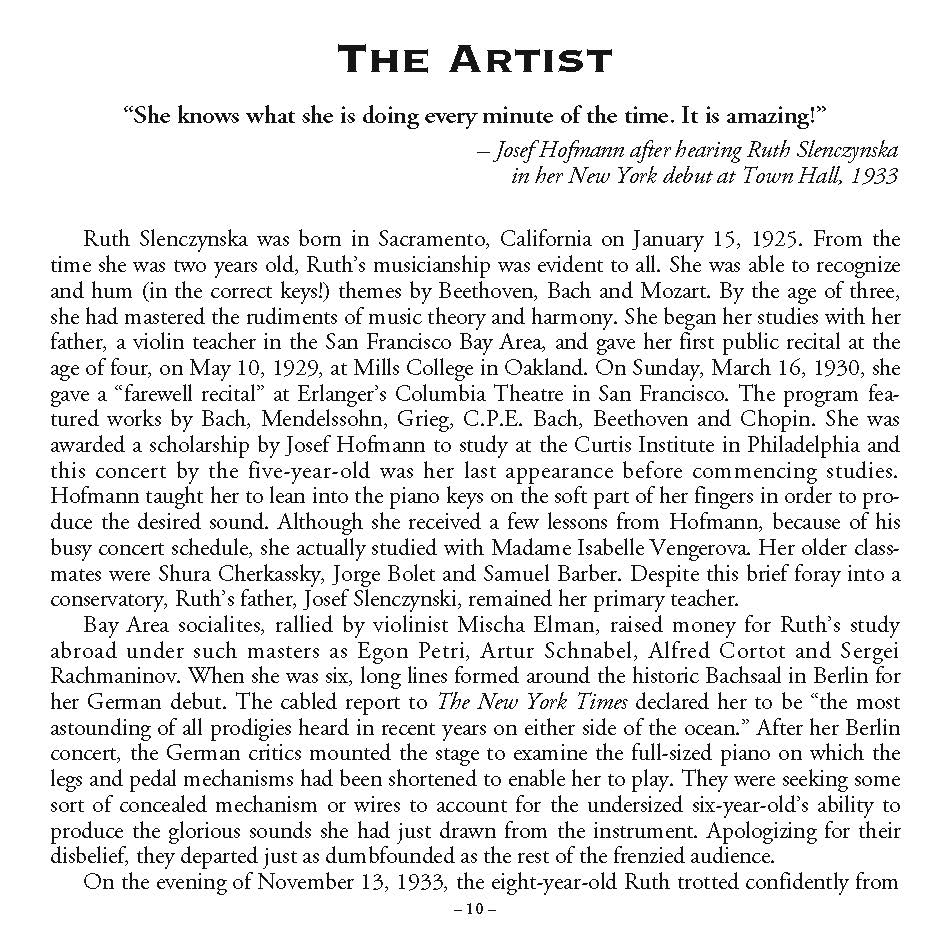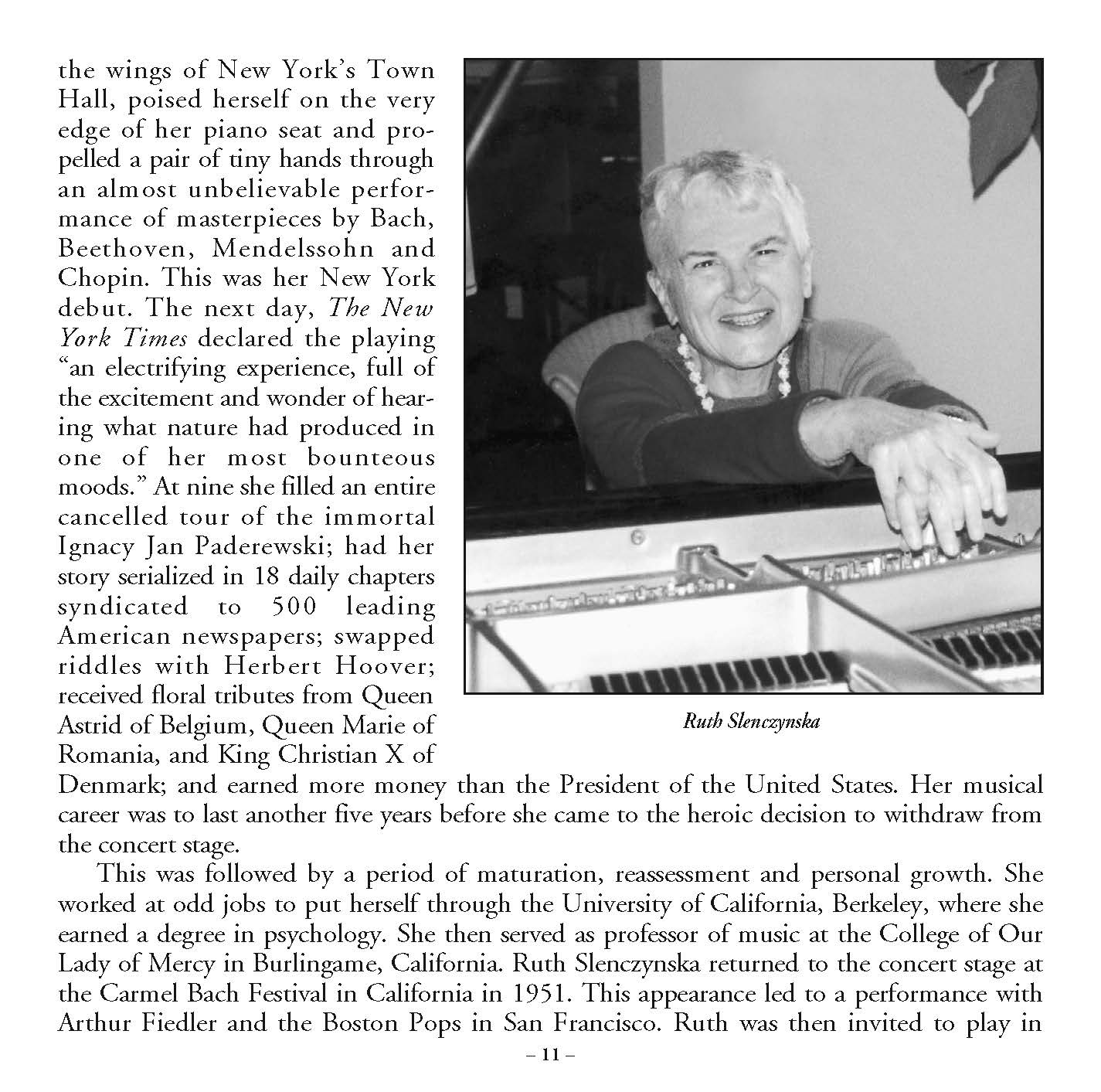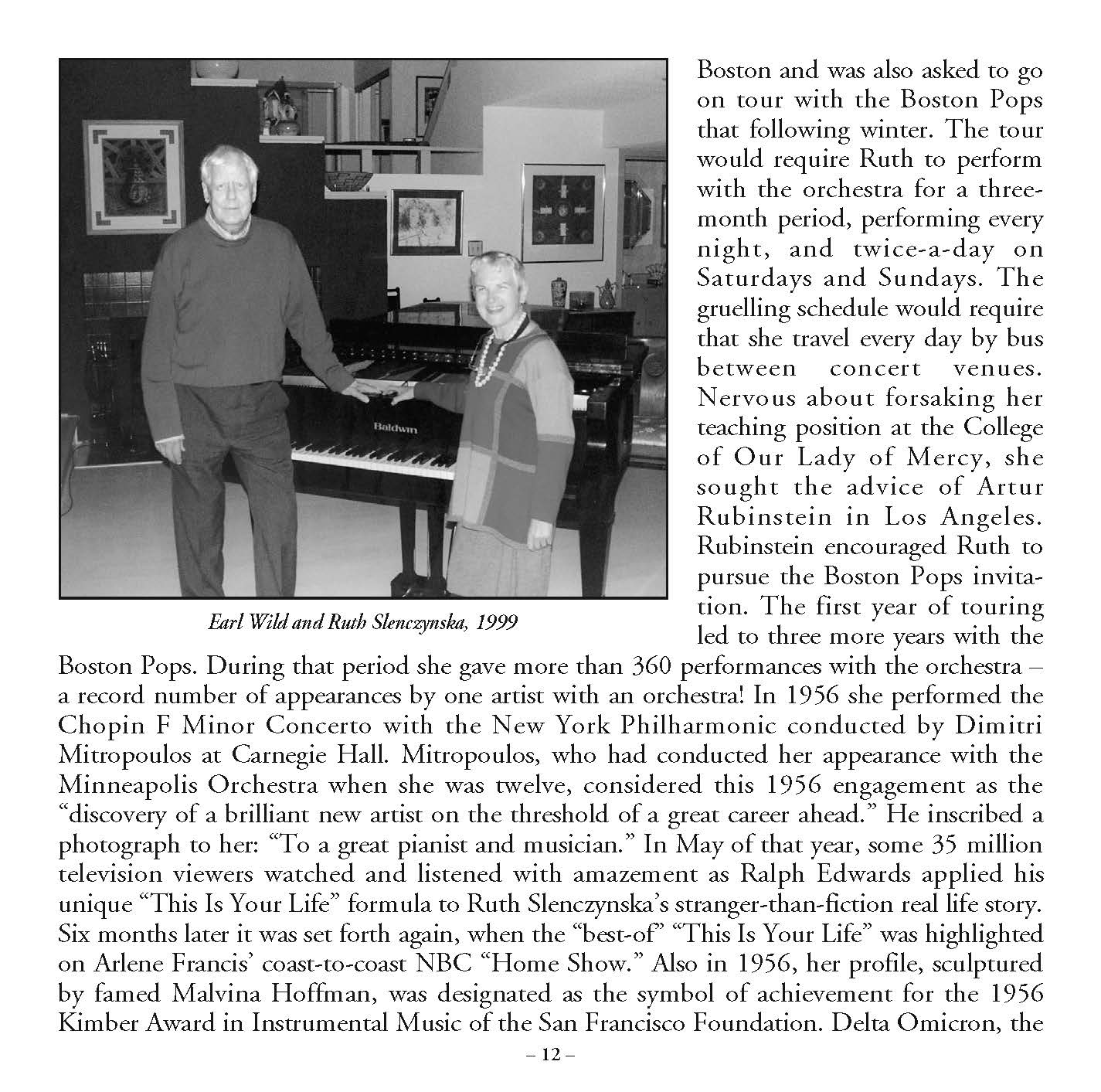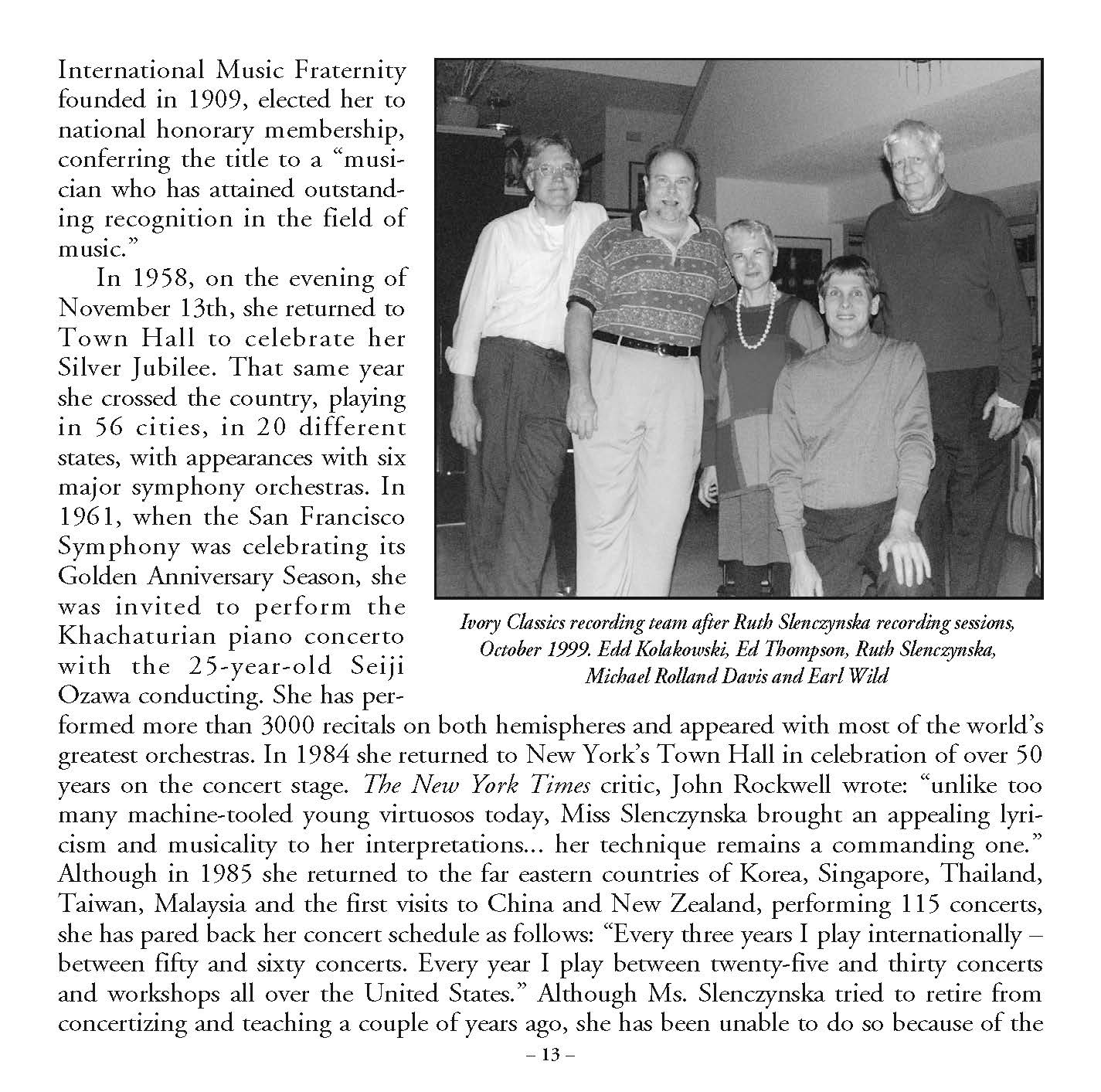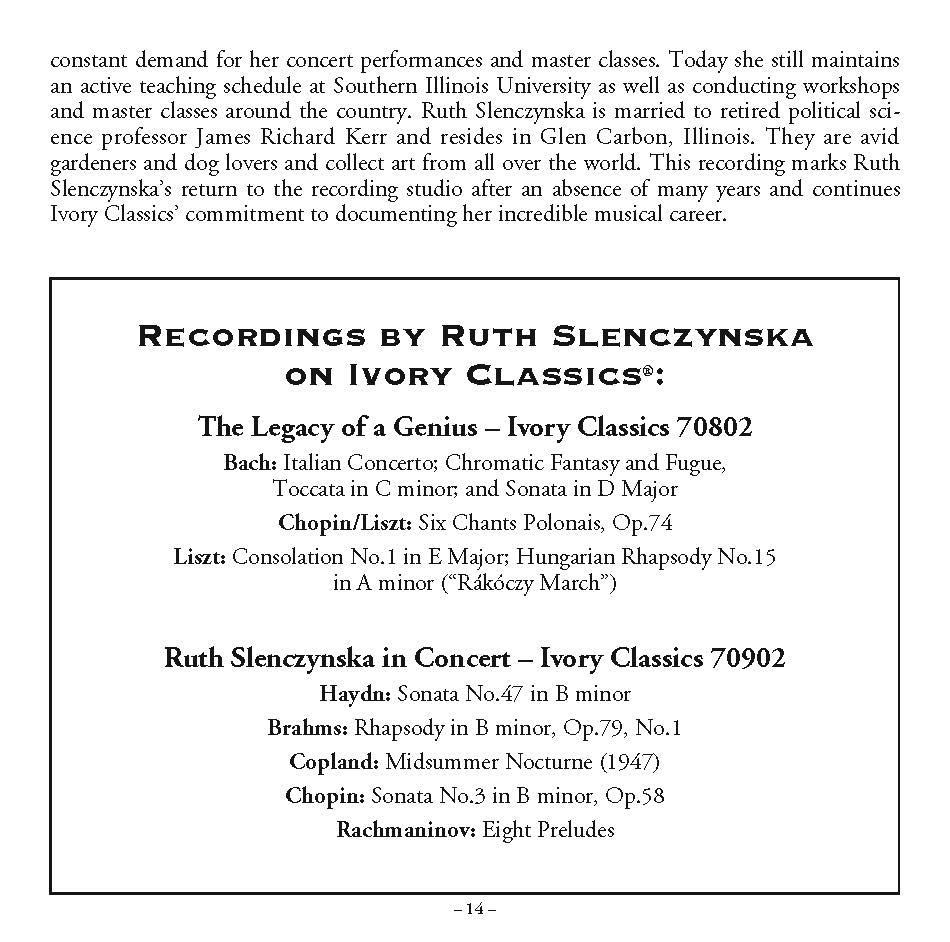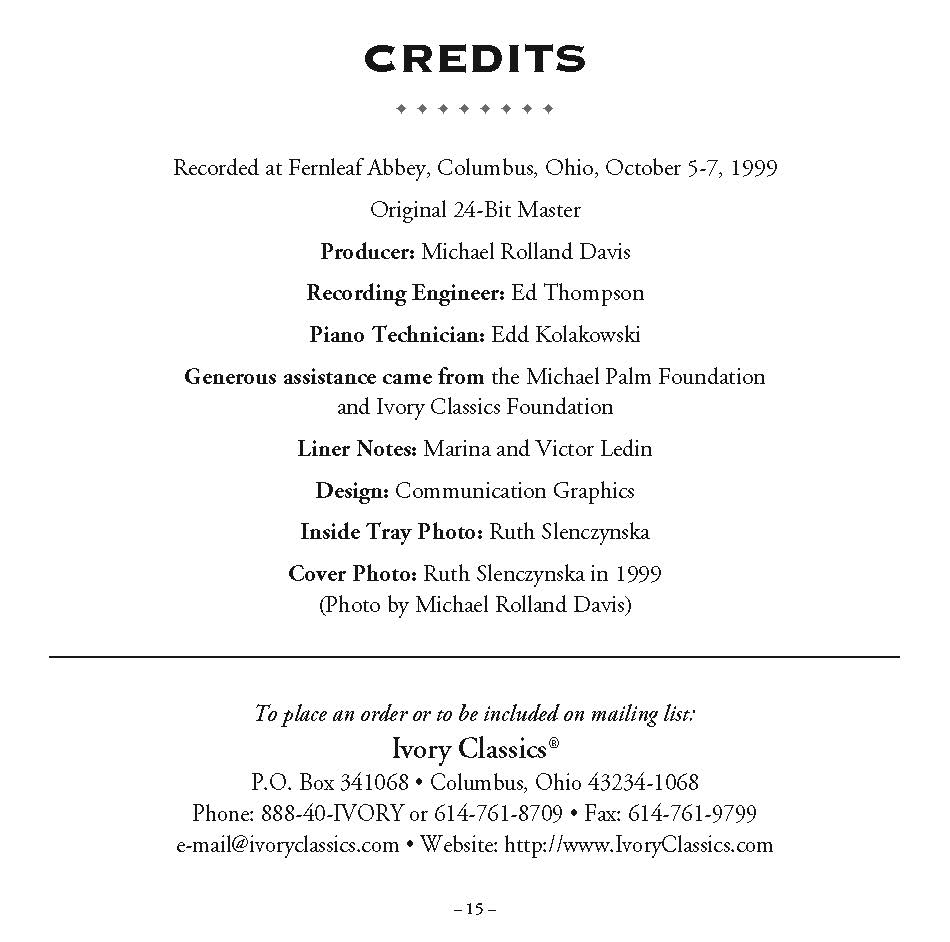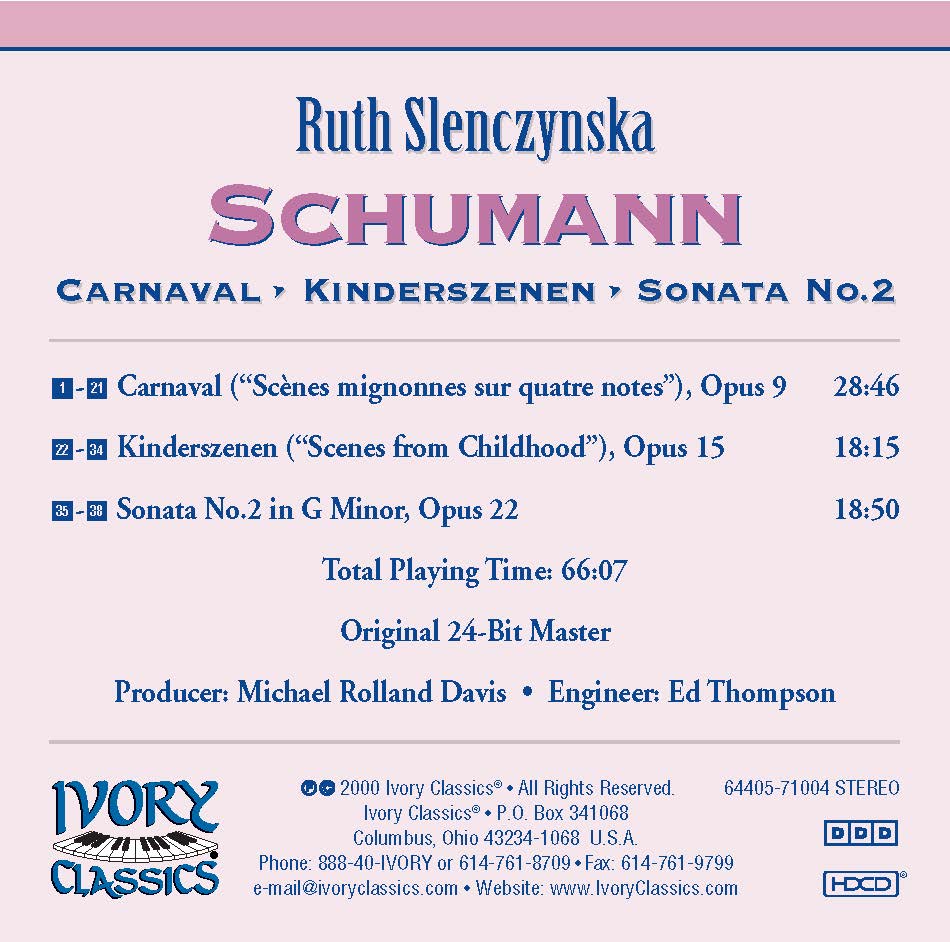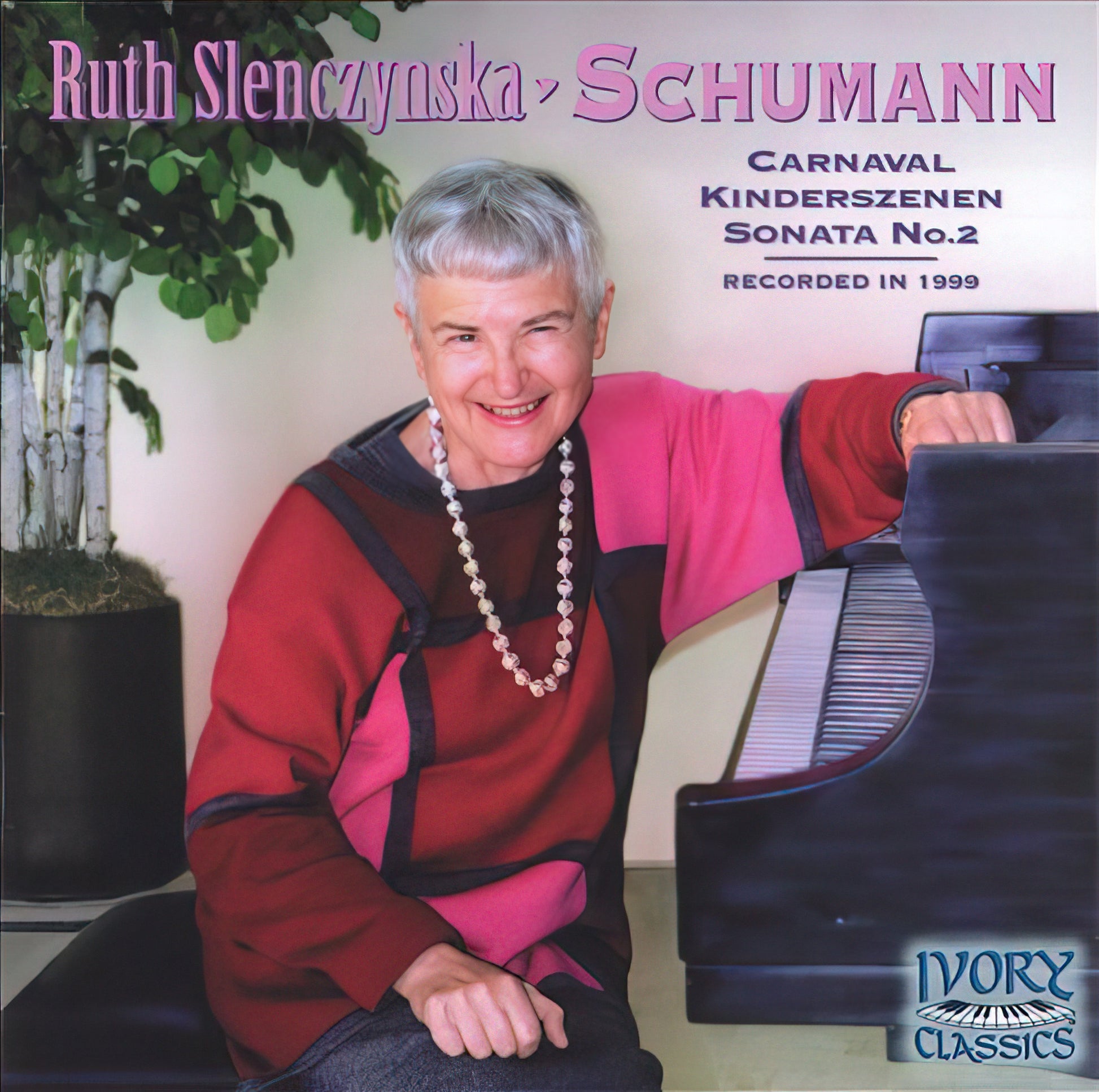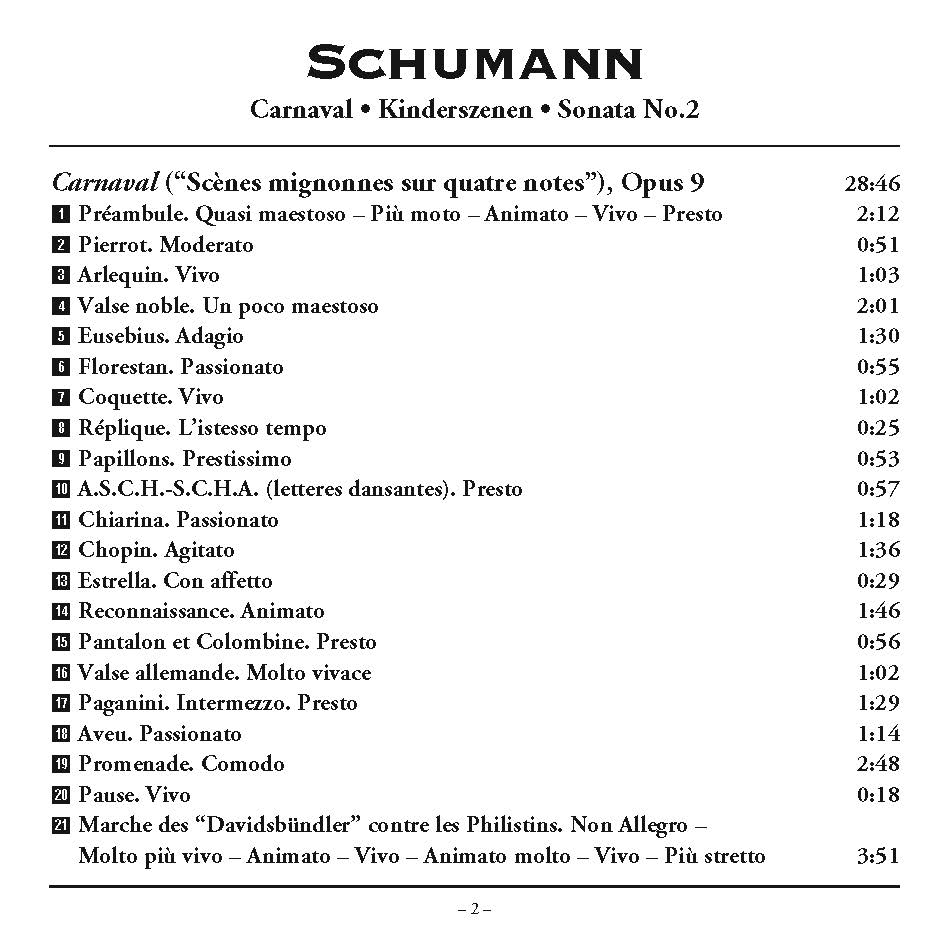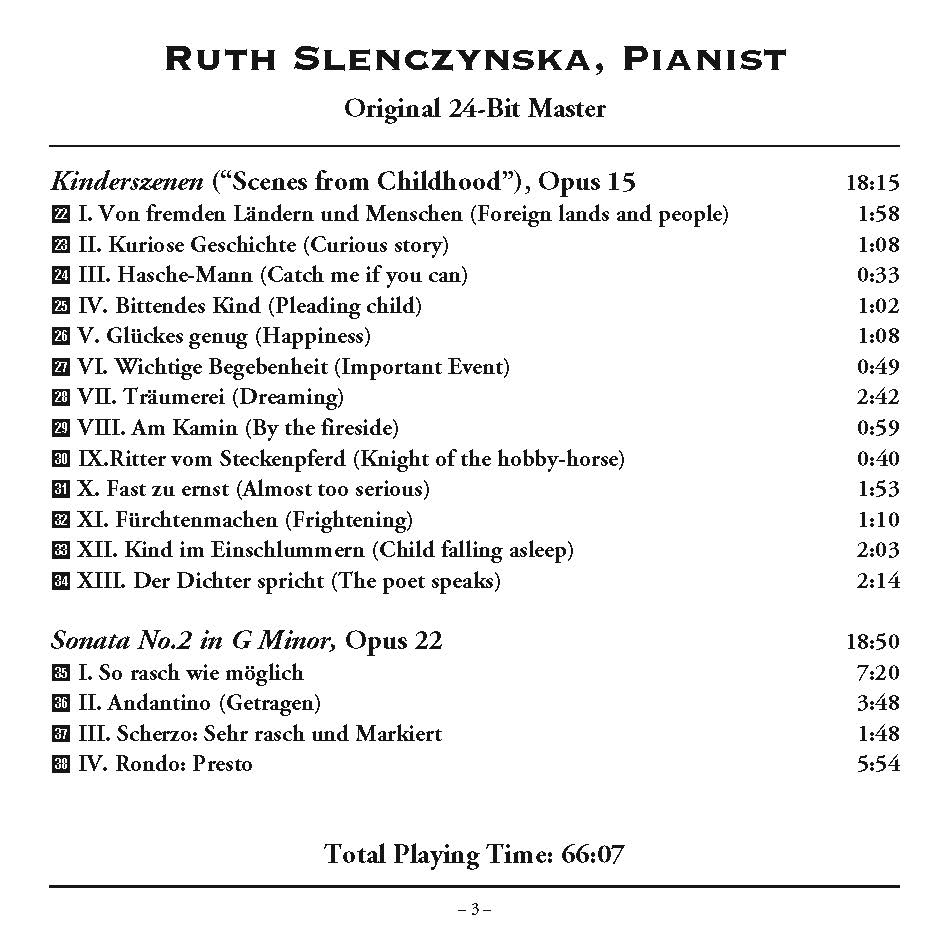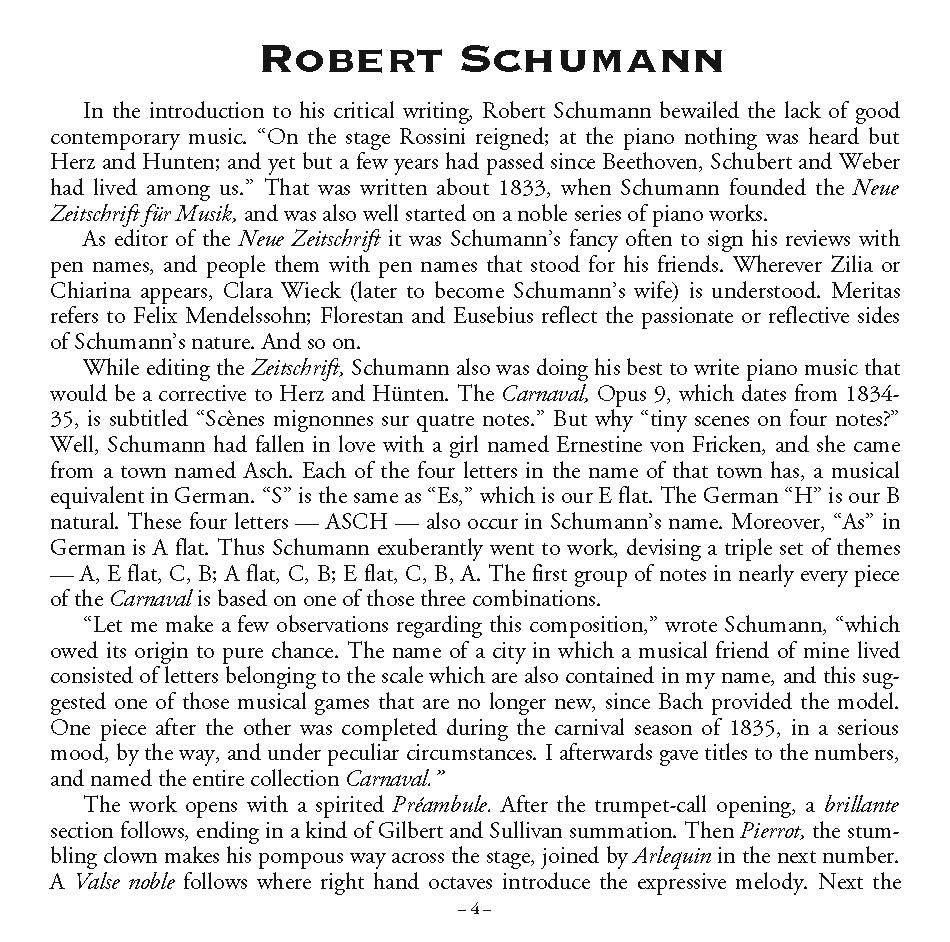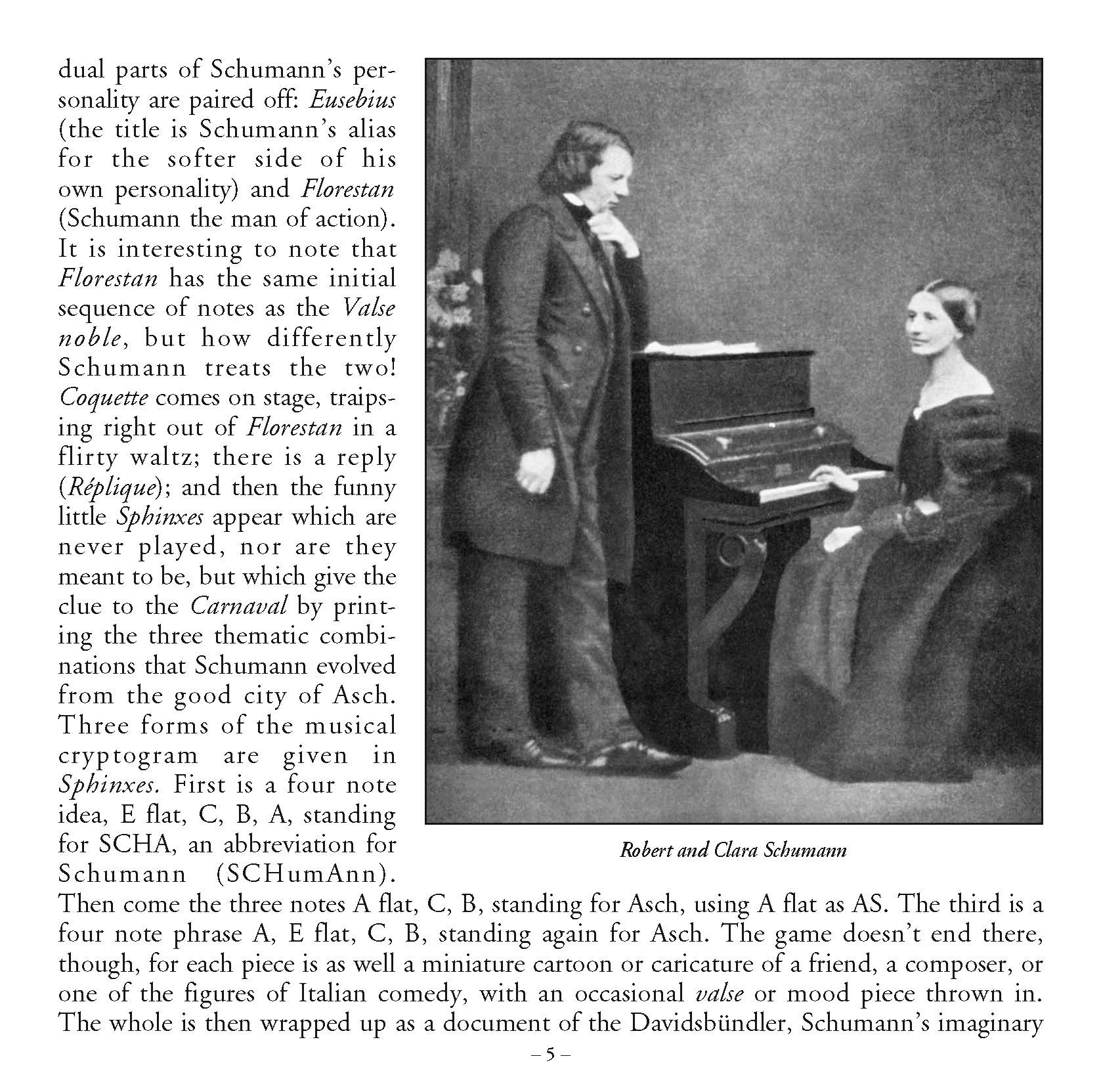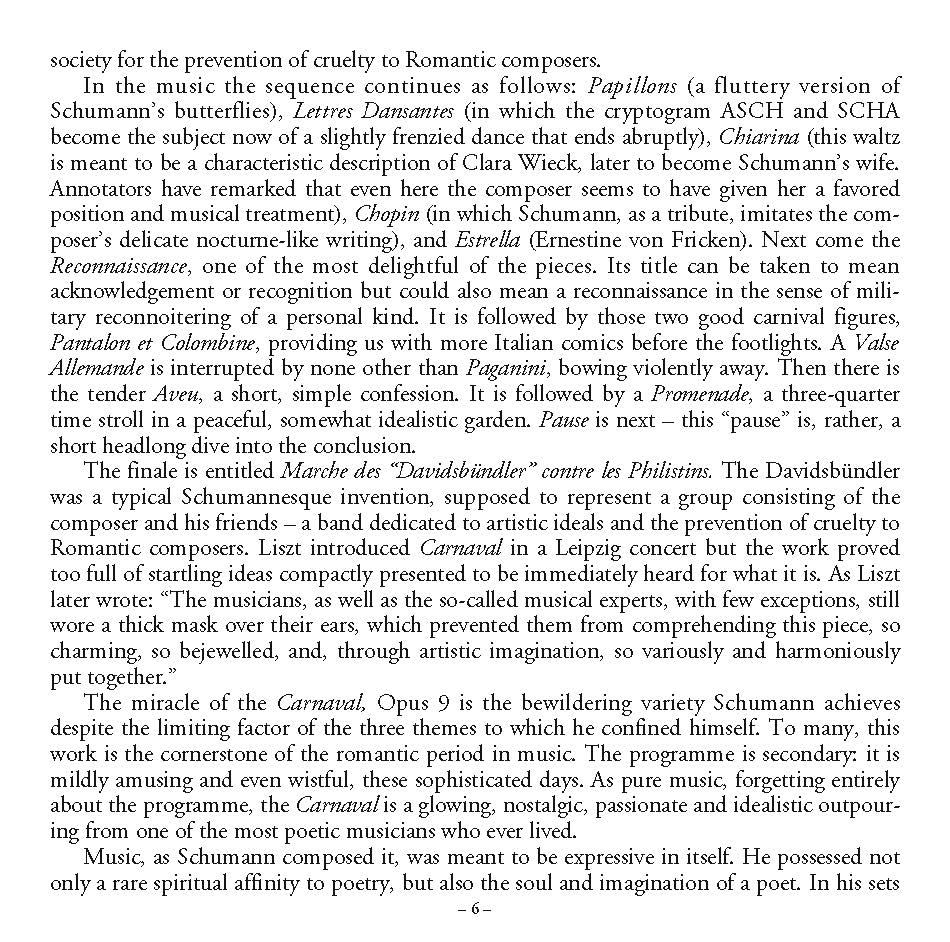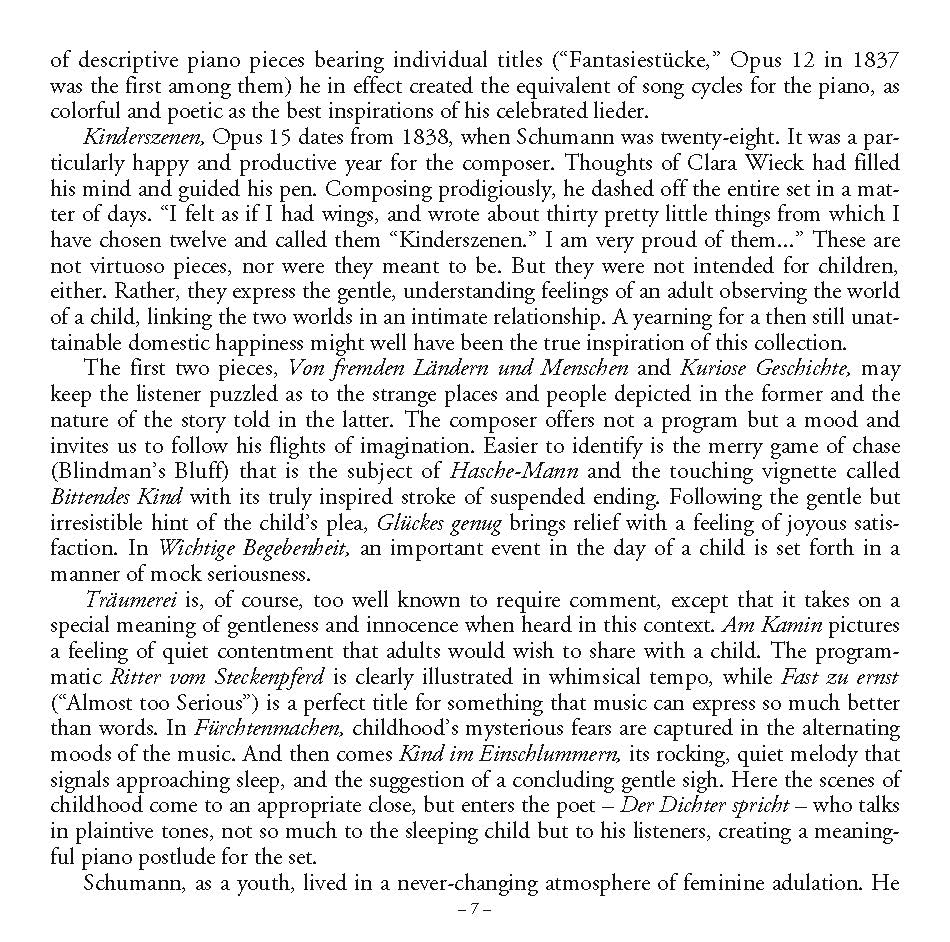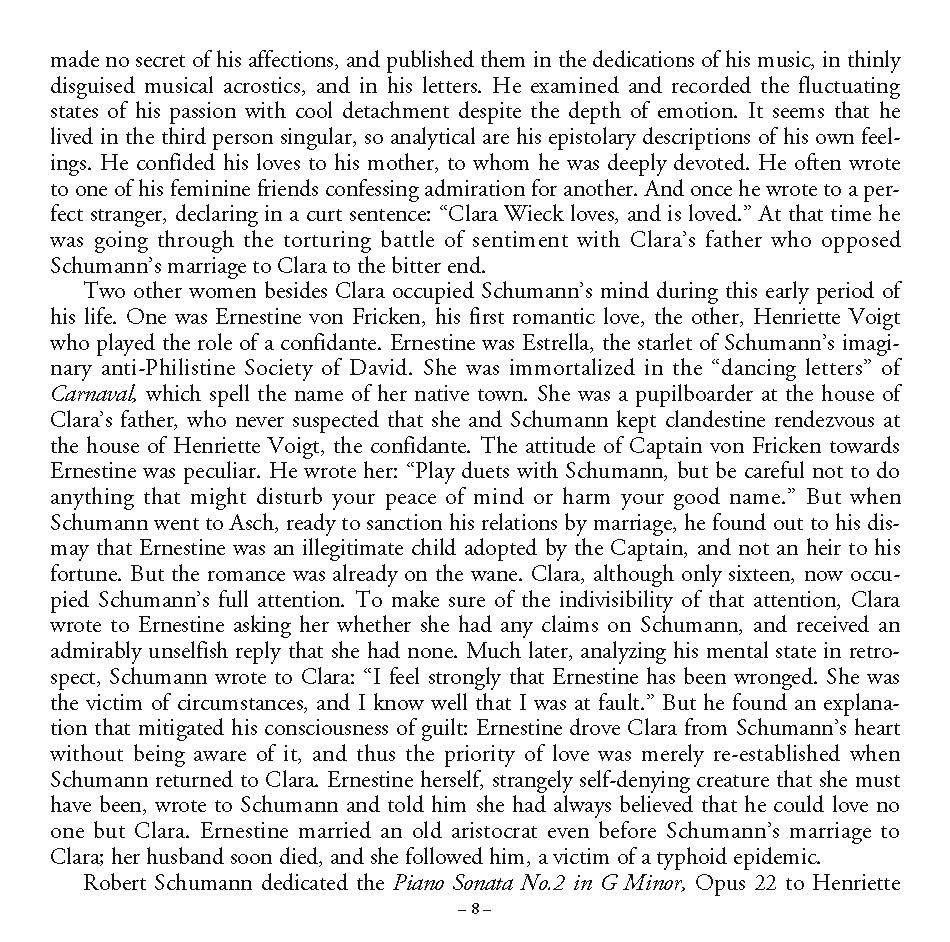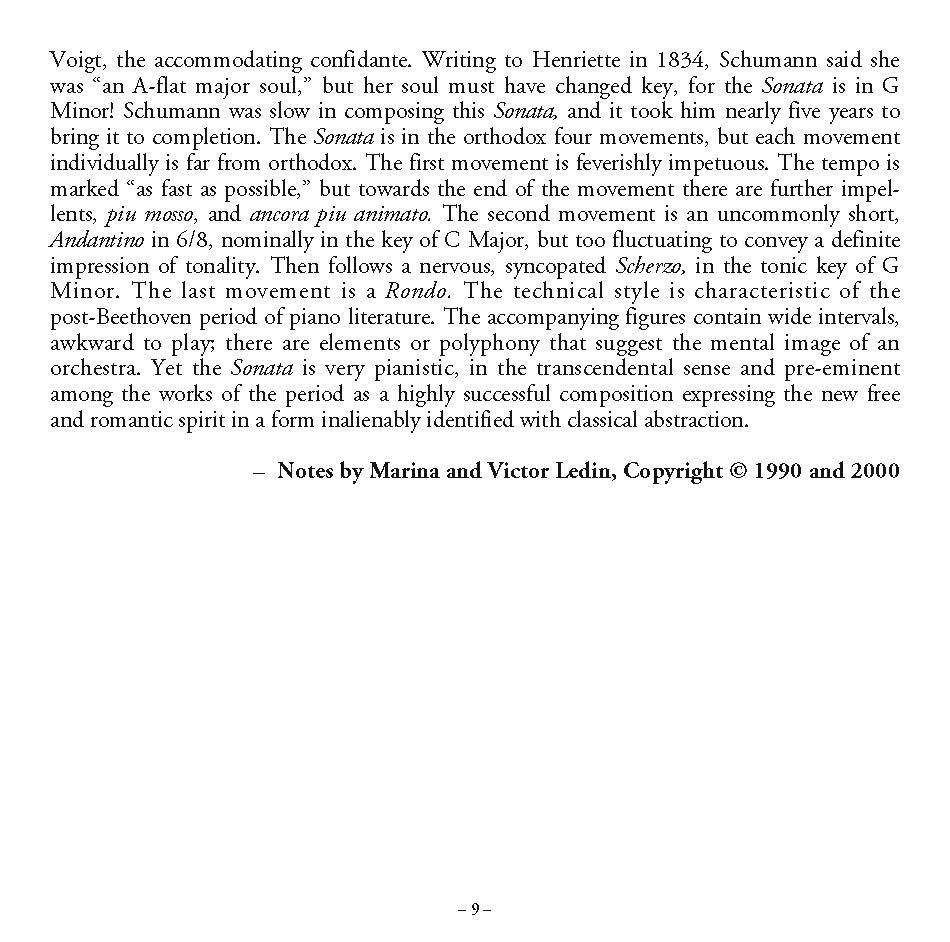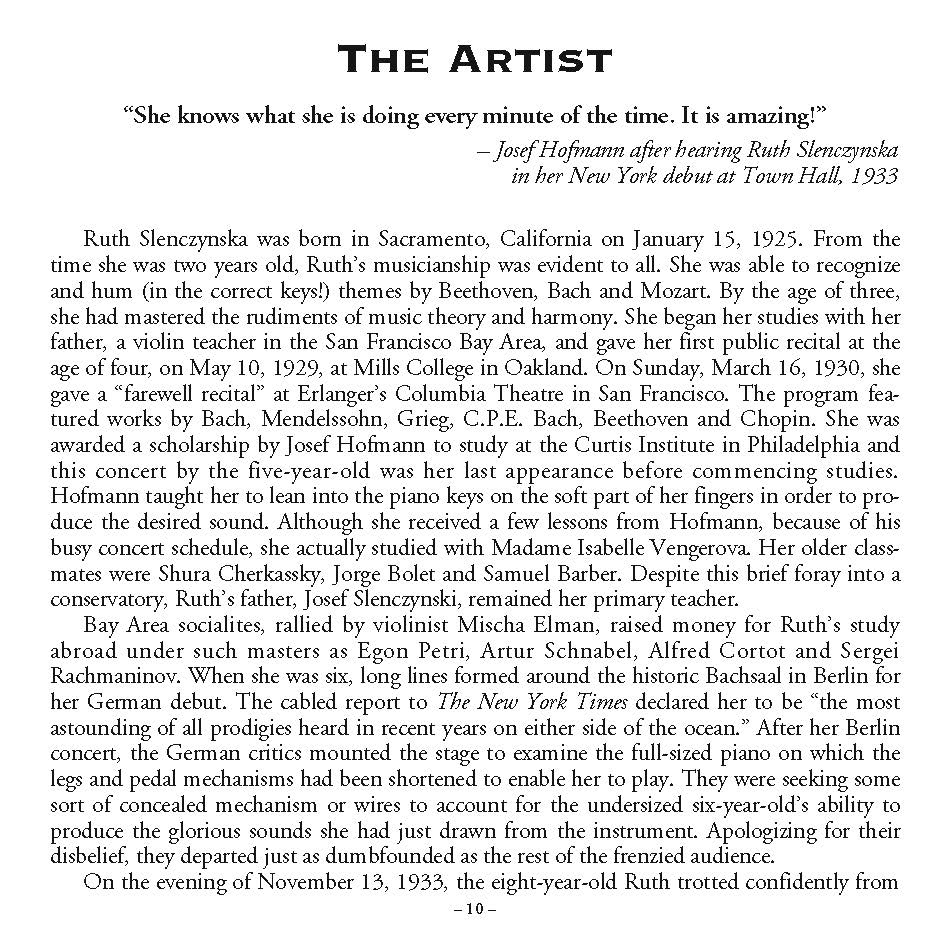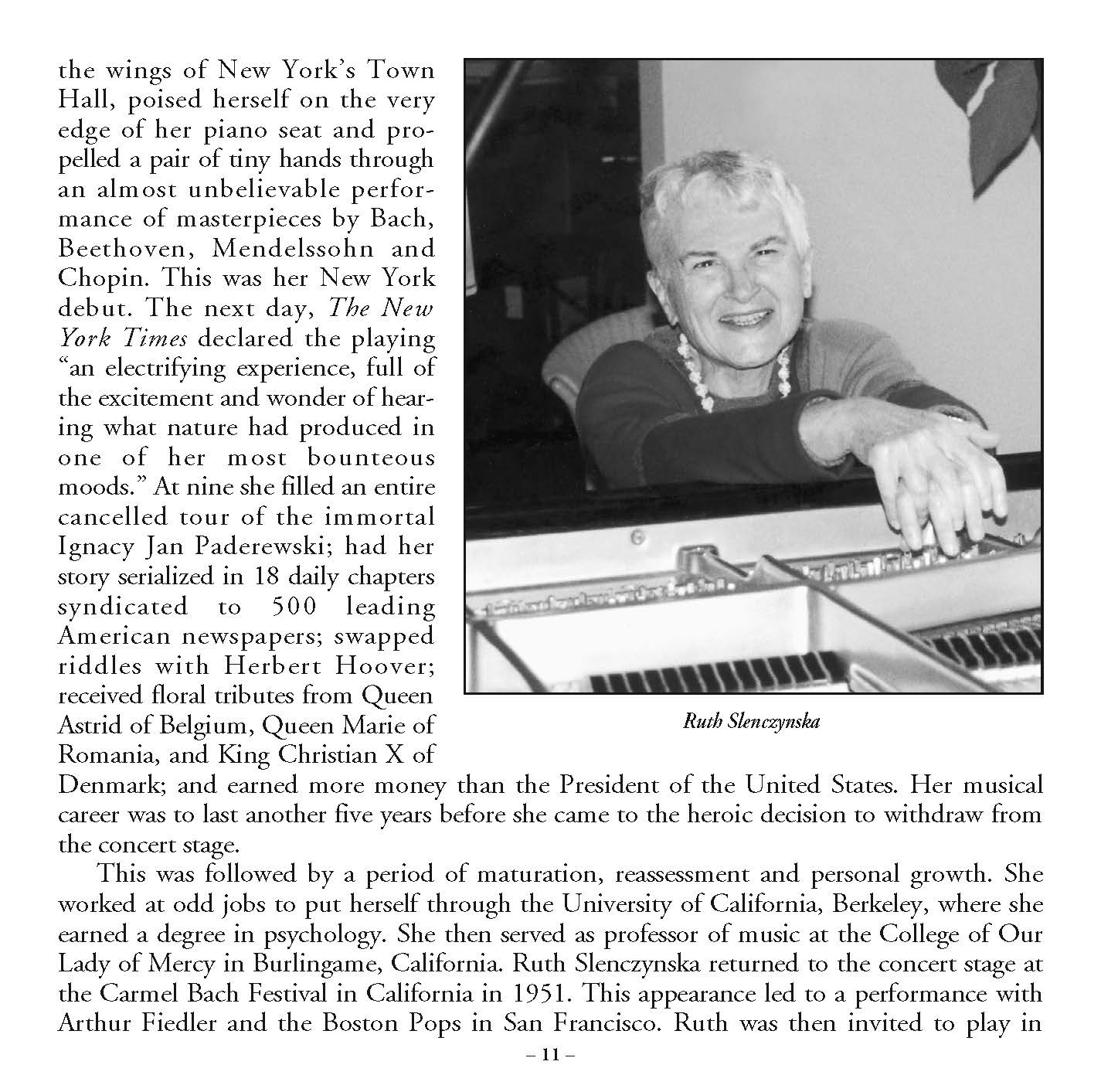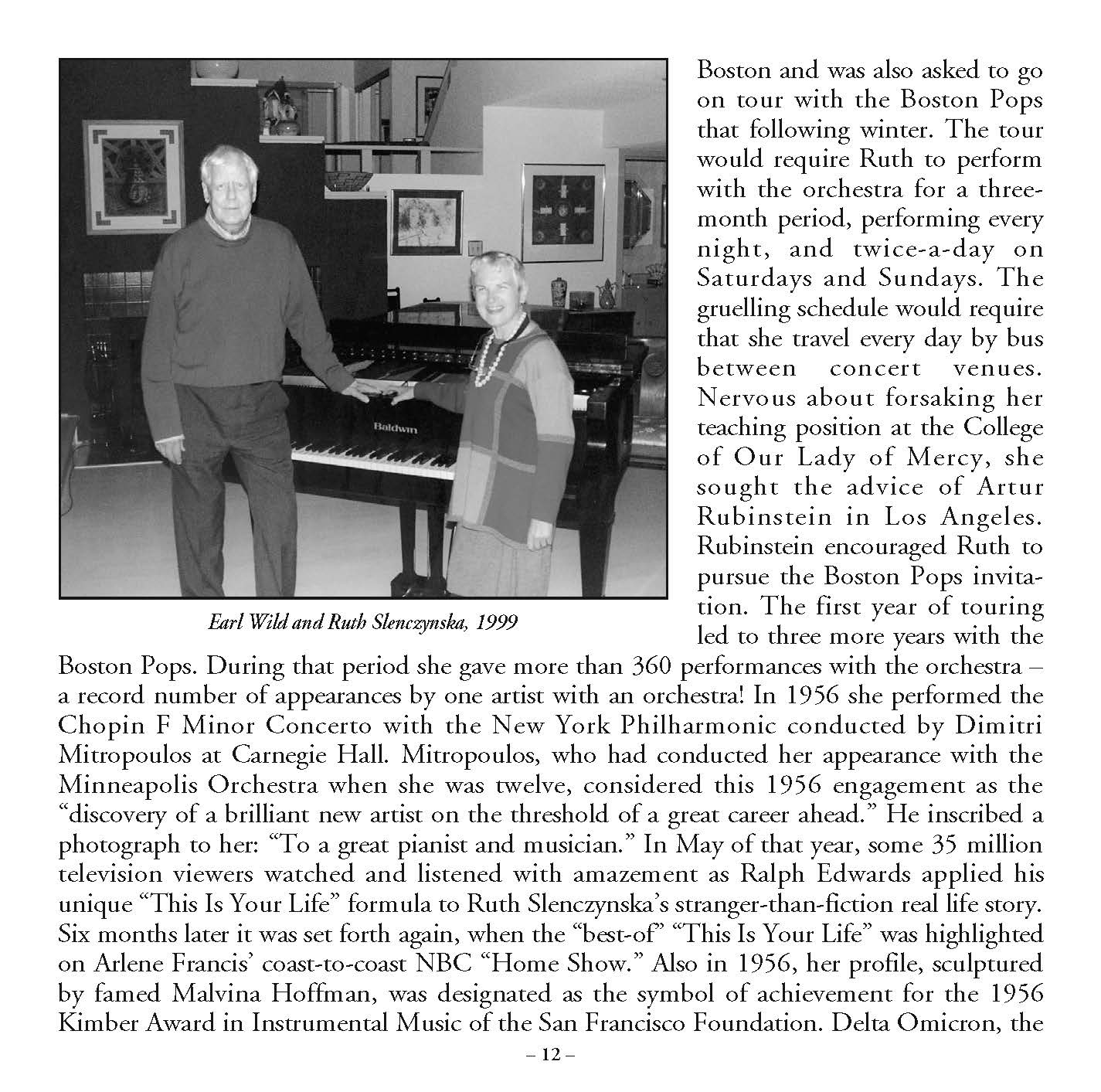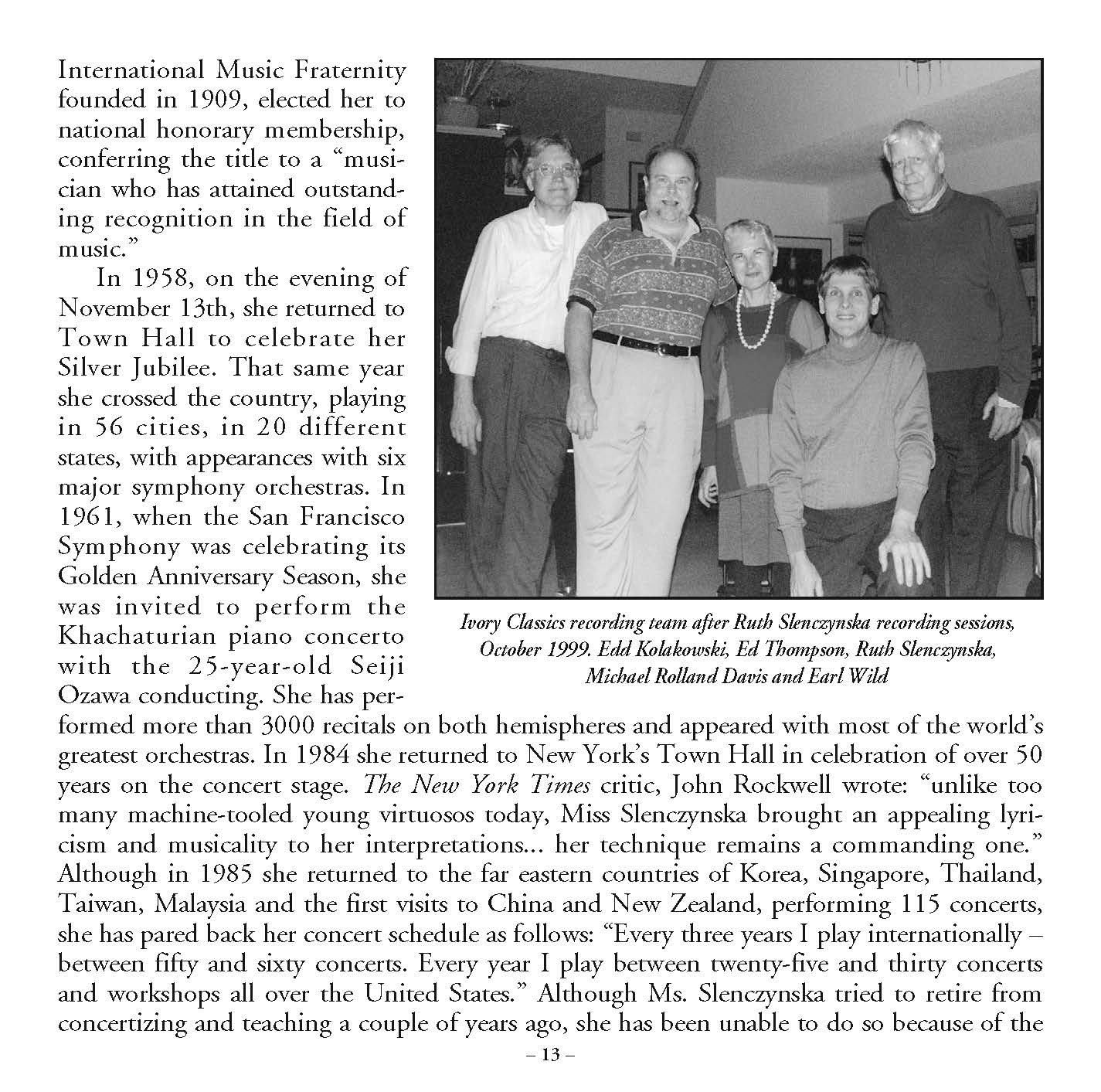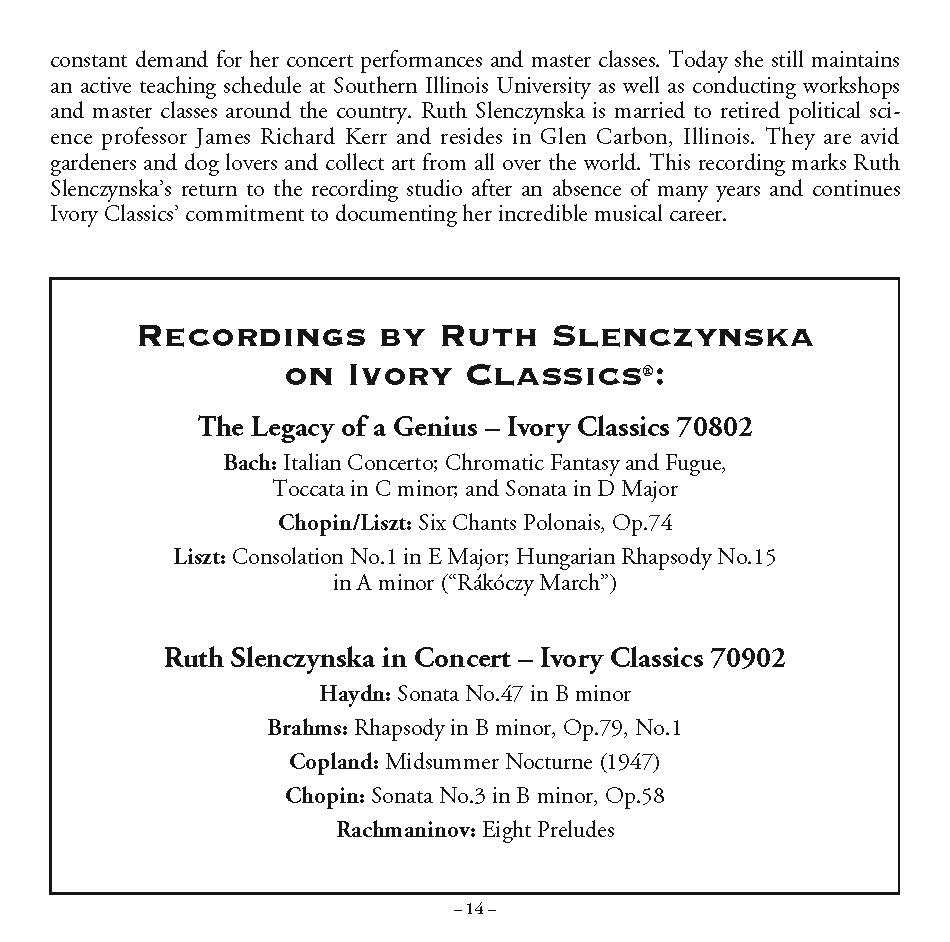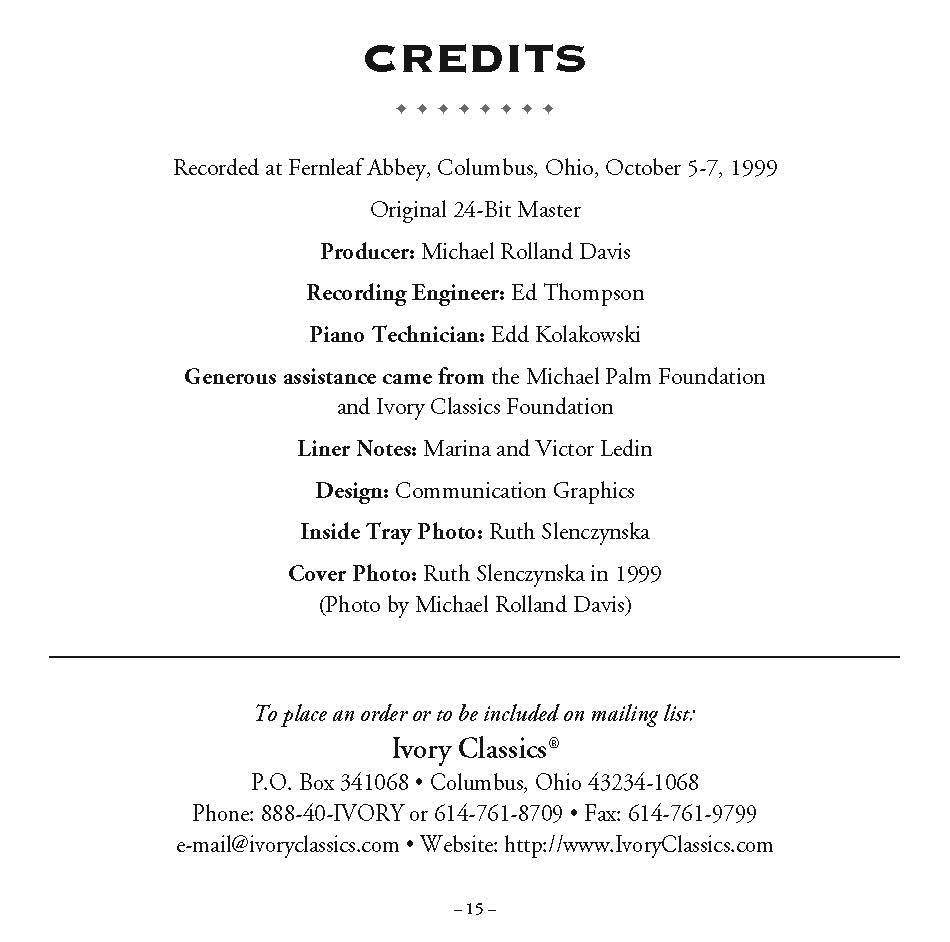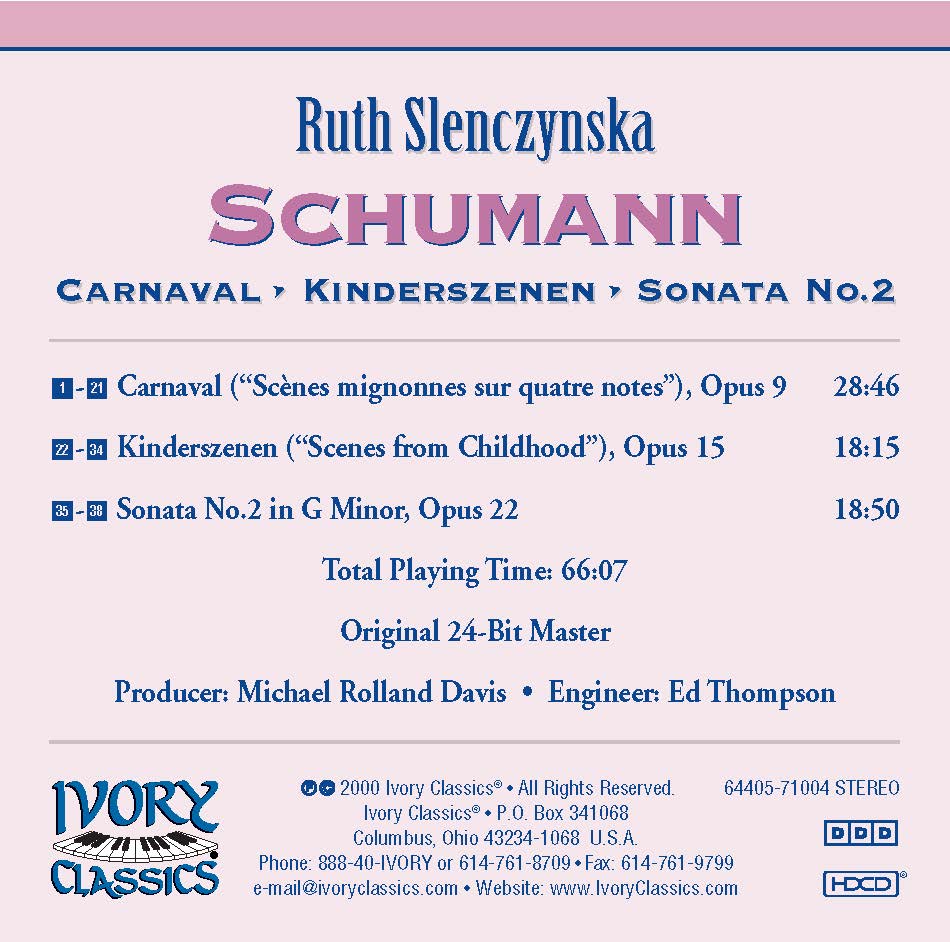Ruth Slenczynska plays Schumann: Carnaval; Kinderszenen; Sonata No. 2
Ruth Slenczynska plays Schumann: Carnaval; Kinderszenen; Sonata No. 2
Couldn't load pickup availability
Ivory Classics CD-71004
Ruth Slenczynska plays Schumann
Robert Schumann (1810-1856)
Piano: Ruth Slenczynska
Producer: Michael Rolland Davis
Engineer: Ed Thompson
Piano: Steinway
(DDD) Recorded October 5-7. 1999,
at Fernleaf Abbey, Columbus, Ohio
Mastered using 24-Bit State-of-the-Art Technology - HDCD Encoded
"She knows what she is doing every minute of the time. It is amazing!" -- Josef Hofmann after hearing Ruth Slenczynska in her New York debut at Town Hall, 1933.
A legendary pianist and virtuosa, Ruth Slenczynska is celebrating her 75th birthday with the release of her first studio recordings in over two decades. This is Ms. Slencznska's first and only Schumann recording. She studied with the greatest pianists of the 20th century, including Egon Petri, Artur Schnabel, Alfred Cortot, and Sergei Rachmaninov. Her interpretations of Schumann's piano works show her masterful phrasing and pacing, impeccable musical taste, along with her golden singing tone. This is truly a recording in the grand pianistic tradition!
Disc.Reviews
I thought "Kinderszenen" began rather lugubriously and the "Curious story" sounded a rather ordinary one, but "Catch me if you can" romps away delightfully and the "Pleading child" is very tenderly done. From that point on the playing is lively and wistful as required and I much enjoyed it. A particular highlight was "Frightening", faster than usual and scuttering and stuttering in a very childish way. For all Slenczynska's warmth, I have to say that only Horowitz, to my knowledge, has succeeded in the almost super-human task of presenting "Traumerei" in a single melodic arch, but Slenczynska is as good as most others.
In the 1960s Richter dumbfounded the world with his headlong approach to the outer movements of the G minor sonata. But his tempi were in accordance with Schumann's metronome markings and more recent performers have tended to follow his example, not necessarily a brilliant idea if you don't have his technical mastery. As befits an interpreter whose roots go back further, Slenczynska is a little broader but with plenty of vitality on her own terms; her handling of the slower second subjects has much natural warmth without letting the momentum sag. Indeed, her ability to build up sonata-form structures confidently leads me to hope that some Beethoven might be forthcoming from her. There is no wallowing in the second movement, as befits the "Andantino" marking. There is even a case for feeling that it is kept too much on the move, for Schumann added in brackets "Getragen" (sustained) and the two directions hardly seem compatible. On the grounds that Schumann's German was certainly better than his Italian, it might seem safer to trust the German marking. The Scherzo is a very fiery affair.
All in all, this is a warmly played Schumann disc which can be recommended to those to whom the program appeals, and especially those who see in Schumann the sublimation of "hausmusik" rather than the expression of painful neuroses. Reading through the lines, you will perhaps have gathered that I am not entirely convinced that a long-neglected genius has been re-discovered, but I hope to hear more from her nonetheless.
Music Web.com, Mar. 2003
Ruth Slenczynska is a former child prodigy whose adult career often had her barnstorming across the US with the Boston Pops as well as hopping between South Africa and Vienna with near-daily concerts. Slenczynska's fingers probably have more mileage on them than any major pianist since Arthur Rubinstein. As of this recording in 1999, this mileage is apparent in the best possible ways. At age 75, the bright, crystalline clarity of her sonority seems to have even more substance, particularly as caught in this straightforward acoustic. She maintains a remarkable smoothness of line that makes her performances immediately identifiable, along with a fiercely chiseled quality that dares you to think the music should be played any differently. Tiny rubatos are everywhere throughout this disc, often within a given phrase; the effect is of a fresh variation to every thematic restatement, whether in the wonder-filled simplicity of Kinderszenen's opening movement or in the climax of the first movement of Piano Sonata No.2, in which her phrasing delivers great cumulative energy. Especially happy meetings of wisdom and fingers are heard in the 'The Knight of the Hobby-Horse' movement of Kinderszenen, in which the notes splash out in waves with seemingly spontaneous force, underscored by that elemental Slenczynska bass, which seems to rise from the bowels of the earth. This disc is a treasure.
Stereophile, Nov. 2000
This recording was made in 1999 when Ms. Slenczynska was 75. It's no exaggeration to say that Slenczynska performance of the Carnaval belongs in the same distinguished company as Rachmaninov, Argerich and Rubinstein. Her Carnaval is absolutely splendid - this is simply stunning piano playing. Unlike many pianists, she neither underplays nor overplays the exquisite miniatures of Scenes from Childhood. In the Sonata No.2 she turns in a highly passionate and achingly lyrical reading.
American Record Guide, Oct. 2000
Slenczynska was, like Curzon, a Schnabel pupil, but she takes a radically different approach to the instrument, favoring a much bolder, even more aggressive, pianistic style, with wider dynamics, more biting accents, more jagged accompaniments, snappier rhythms. Paradoxically, Slenczynska at 75 sounds far more youthful than Curzon at 47: Her confident rout of the Philistines at the end of Carnaval is especially intoxicating. Even in those treacherous dotted-rhythm passages that tie so many performers in knots, she inevitably maintains the music's line. All in all, then, an important addition to Ivory Classic's revelatory Slenczynska series.
Fanfare Magazine, Oct. 2000
Ruth Slenczynska began her career as an internationally acclaimed child prodigy. Her return to the studio after many years yielded the present Schumann recital. Not all pianists can claim to have made their best recordings at 75, but such is the case here. Slenczynska's fingers are securely intact. Her sonority has mellowed over time, and her musical insights are ripening to a telling degree. She uncovers delicious inner counterpoints in Pierrot and the Valse Noble. The pianist's measured tempo for Papillon clarifies Schumann's displaced metrics. Also listen to how she sculpts each note of the Chopin movement's left-hand accompaniment into a golden, singing line. Slenczynska's seasoned deliberation throughout the G minor Sonata reveals a clear symphonic grid beneath Schumann's congested textures. She also has a forthright, well-considered Kinderszenen.
Classics Today, Oct. 2000
A true child of the Romantic tradition in her repertory and in her manner of expression, she plays Schumann with the same authority and thoughtful conviction as Moiseiwitsch and Horowitz did a generation ago, each section of a suite, like Carnaval, emerging as a real character piece, a fully-formed personality. At 75 years old, Slenczynska show no signs of fatigue or strain in her playing: the octaves in the March Against the Philistines, the Paganini section, the accumulated velocity of the whirlwind waltzes, make a sensational impact. But the softer, Eusebius, sections of the suite are even more compelling: her extra repeat of the refrain in Valse noble, her wistfulness in the Aveu, her long, silken line in the evocation of Chopin, all make for a colossal standard of comparison for the new millennium. No less a service is rendered by Ed Thompson's audio engineering, making this one of the most coveted albums for the new year, a credit to any pianophile's basic collection.
Audiophile Audition, Aug. 2000
Ruth Slenczynska was one of the most famous prodigies ever. This 1999 recording is her first studio recording in decades and is her first Schumann recording. Her technique is never in doubt. In the lyrical music of Kinderszenen, she is rivetingly intense and very moving. She gives us a splendid performance of the Sonata - full of drama. Well worth hearing. Schumann's inner voices have never been clearer than they are in Slenczynska's new recording. Hers are revisionist interpretations of remarkable importance. It's wonderful to have new recordings by Ruth, in modern HDCD stereo on a great piano.
Amazon.com, Jun. 2000
